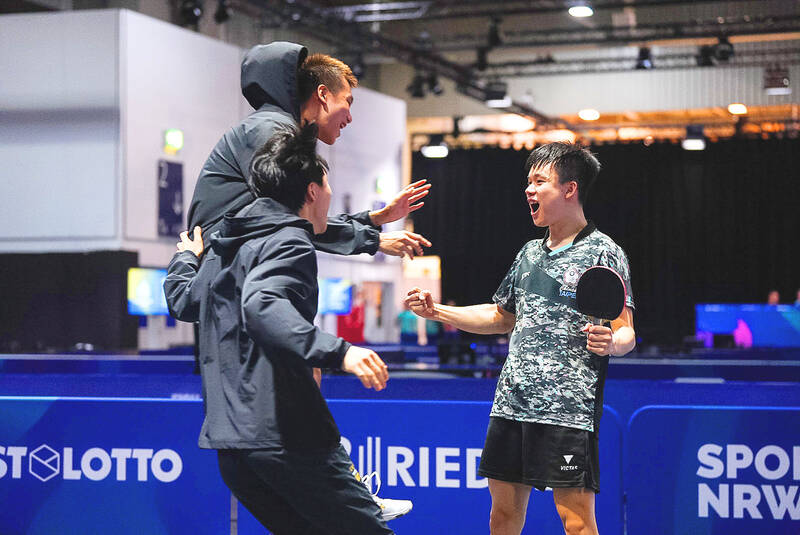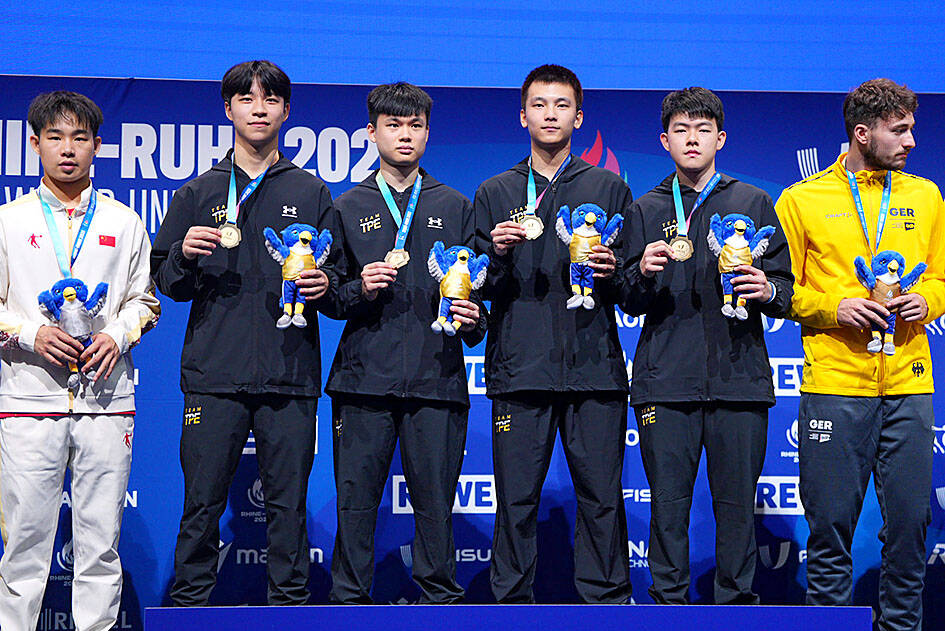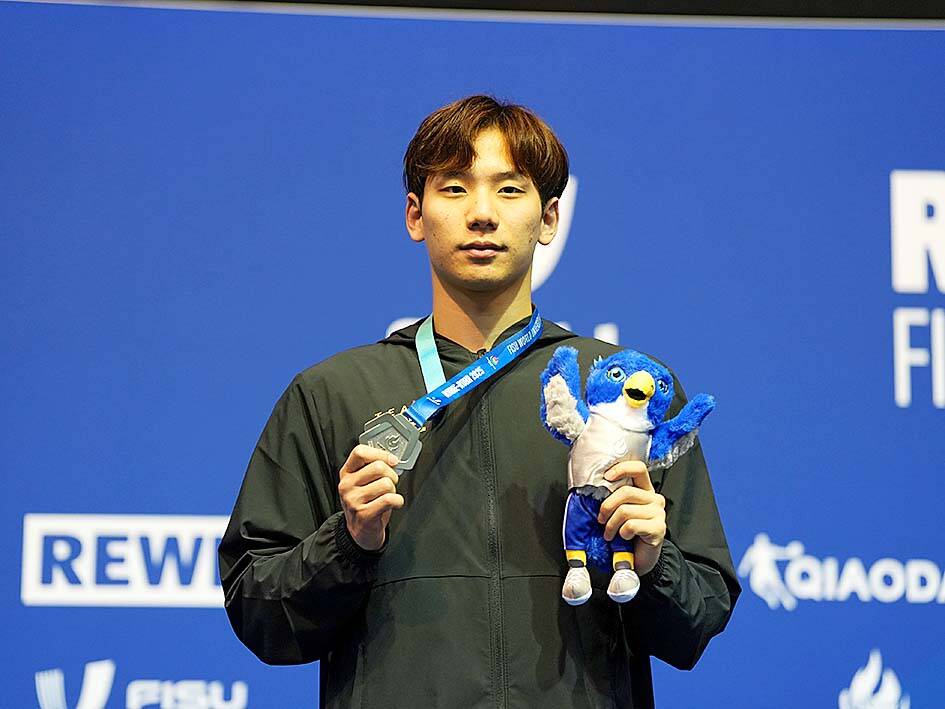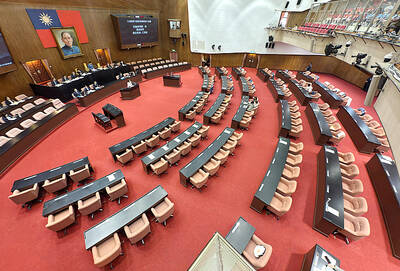Taiwan’s men’s table tennis team on Sunday defeated China 3-2 in the final at this year’s Summer World University Games in Germany, securing Taiwan’s first-ever gold medal in the event.
The competition followed a best-of-five singles format. Taiwan’s team was composed of Feng Yi-hsin (馮翊新), Kao Cheng-jui (高承睿) and Huang Yan-cheng (黃彥誠).
Feng opened the match with a 3-1 victory over Chen Junsong (陳俊菘) (11-7, 11-3, 7-11, 11-7), giving Taiwan a 1-0 lead. However, world No. 25 Kao fell to Sun Zheng (孫政) 1-3 (8-11, 11-8, 5-11, 5-11), leveling the score at 1-1.

Photo courtesy of the Chinese Taipei University Sports Federation via CNA
Huang, playing the third match, put Taiwan back into a 2-1 lead by defeating Zeng Beixun (曾蓓勳) 3-1 (11-4, 8-11, 12-10, 11-6).
Kao returned for the fourth match, but lost to Chen, tying the score at 2-2.
Feng then clinched the victory for Taiwan with a 3-2 win over Sun in the final match.

Photo courtesy of the Chinese Taipei University Sports Federation
The victory was Taiwan’s first-ever gold in the men’s team table tennis event at the University Games, surpassing their previous best of silver.
Feng said the win felt surreal.
“I was nervous in the final match, but my teammates’ cheers gave me confidence,” he said. “Our tactics worked so well, I could hardly believe it.”

Photo courtesy of the Chinese Taipei University Sports Federation
Huang said that their ultimate goal was to win gold, while Kao, who struggled in his matches, thanked his teammates for securing the victory.
“My performance was not even worthy of a bronze,” he said. “I am grateful to my teammates for helping me fulfill this dream.”
Coach Chu Yen-hui (朱硯匯) praised the team’s balanced lineup and trust in one another.
“With Feng stepping up at crucial moments, that is what made this gold medal possible,” he said.
Elsewhere at the Games, Taiwan won three silver medals in the badminton mixed team event, taekwondo and swimming.
In the best-of-five badminton final against China, Taiwanese shuttlers Chen Zhi-ray (陳子睿) and Lin Yu-chieh (林煜傑) fell 13-15, 10-15 to Cui Hechen (崔赫宸) and Peng Jianqin (彭建欽), giving China a 1-0 lead.
Wang Pei-yu (王珮妤) then lost 12-15, 15-12, 7-15 to Yuan Anqi (袁安琪) in the singles match, leaving Taiwan trailing 0-2.
Su Li-yang (蘇力揚) closed the gap to 1-2 by winning the third match, but China sealed the victory with a 3-1 result.
Coach Feng Sheng-chieh (馮勝杰) said that the opening match was pivotal and expressed regret that the team could not secure gold.
Taiwan had won gold in the badminton mixed team event at the 2017 Taipei Universiade, successfully defending their title in 2019 in Naples, Italy, and again clinching gold at the 2021 Chengdu Universiade in China.
Hung Jiun-yi (洪俊義), a first-time World University Games participant from National Changhua University of Education, earned silver after a 1-2 defeat to South Korea’s Seo Geon-woo in the men’s 80kg taekwondo final.
In swimming, Wang Kuan-hung (王冠閎) took silver in the men’s 200m butterfly with a time of 1 minute, 55.85 seconds, just 0.26 seconds behind gold medalist Jack Andrew Dahlgren of the US.
Reflecting on his performance, Wang said that his strong desire to win Taiwan’s first-ever swimming gold at the Games left him feeling dissatisfied, but he was still pleased with his podium finish.
“My goal was gold, but I am still happy to earn a spot on the podium,” he said.

CROSS-STRAIT COLLABORATION: The new KMT chairwoman expressed interest in meeting the Chinese president from the start, but she’ll have to pay to get in Beijing allegedly agreed to let Chinese Nationalist Party (KMT) Chairwoman Cheng Li-wun (鄭麗文) meet with Chinese President Xi Jinping (習近平) around the Lunar New Year holiday next year on three conditions, including that the KMT block Taiwan’s arms purchases, a source said yesterday. Cheng has expressed interest in meeting Xi since she won the KMT’s chairmanship election in October. A source, speaking on condition of anonymity, said a consensus on a meeting was allegedly reached after two KMT vice chairmen visited China’s Taiwan Affairs Office Director Song Tao (宋濤) in China last month. Beijing allegedly gave the KMT three conditions it had to

‘BALANCE OF POWER’: Hegseth said that the US did not want to ‘strangle’ China, but to ensure that none of Washington’s allies would be vulnerable to military aggression Washington has no intention of changing the “status quo” in the Taiwan Strait, US Secretary of Defense Pete Hegseth said on Saturday, adding that one of the US military’s main priorities is to deter China “through strength, not through confrontation.” Speaking at the annual Reagan National Defense Forum in Simi Valley, California, Hegseth outlined the US Department of Defense’s priorities under US President Donald Trump. “First, defending the US homeland and our hemisphere. Second, deterring China through strength, not confrontation. Third, increased burden sharing for us, allies and partners. And fourth, supercharging the US defense industrial base,” he said. US-China relations under

The Chien Feng IV (勁蜂, Mighty Hornet) loitering munition is on track to enter flight tests next month in connection with potential adoption by Taiwanese and US armed forces, a government source said yesterday. The kamikaze drone, which boasts a range of 1,000km, debuted at the Taipei Aerospace and Defense Technology Exhibition in September, the official said on condition of anonymity. The Chungshan Institute of Science and Technology and US-based Kratos Defense jointly developed the platform by leveraging the engine and airframe of the latter’s MQM-178 Firejet target drone, they said. The uncrewed aerial vehicle is designed to utilize an artificial intelligence computer

The Chinese Nationalist Party (KMT) caucus yesterday decided to shelve proposed legislation that would give elected officials full control over their stipends, saying it would wait for a consensus to be reached before acting. KMT Legislator Chen Yu-jen (陳玉珍) last week proposed amendments to the Organic Act of the Legislative Yuan (立法院組織法) and the Regulations on Allowances for Elected Representatives and Subsidies for Village Chiefs (地方民意代表費用支給及村里長事務補助費補助條例), which would give legislators and councilors the freedom to use their allowances without providing invoices for reimbursement. The proposal immediately drew criticism, amid reports that several legislators face possible charges of embezzling fees intended to pay